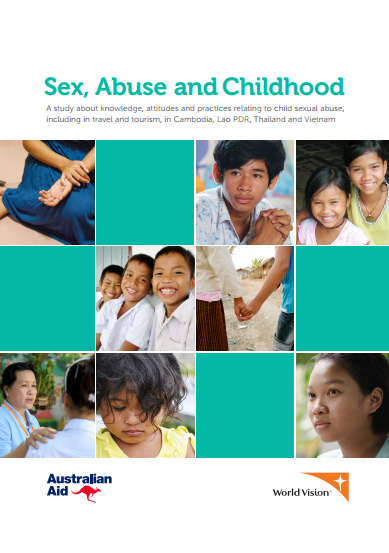
Sex, Abuse and Childhood
Publication Year: 2014 / Sources: World VisionThis report presents an overview of the findings of four separate studies conducted in vulnerable communities in Cambodia, Lao PDR, Thailand, and Vietnam on knowledge, attitudes and practices related to child sexual abuse, including in travel and tourism. The studies were undertaken to contribute to the design and conceptual platform of Project Childhood Prevention Pillar.
Download: English | Khmer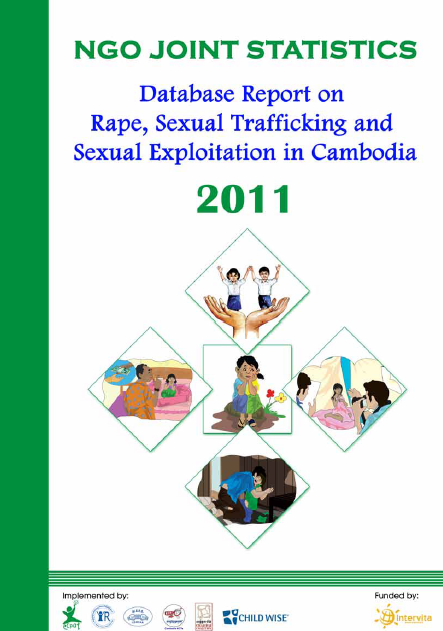
Database Report on Rape, Sexual Trafficking and Sexual Exploitation in Cambodia
Publication Year: 2011 / Sources: ECPAT CambodiaThis report aims to provide stakeholders and the public with a general insight into the dynamics and trends of Sexual Trafficking, Sexual Exploitation and Rape in Cambodia, and to provide relevant stakeholders (for example, international organizations, NGOs, government agencies) useful information to keep up-to-date with dynamics and trends, as well as inform the identification of intervention priorities and strategies. On the other hand, the Reports aim to improve the general public’s access to (basic) information on three serious issues affecting Cambodian society.
Download: English | Khmer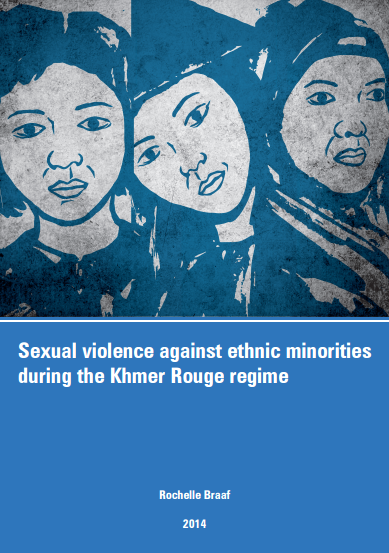
Sexual Violence Against Ethnic Minorities During the Khmer Rouge Regime
Publication Year: 2014 / Sources: Rochelle Braaf, Cambodian Defenders Project (CDP)The research set out to compile data on the extent and characteristics of sexual violence against ethnic minorities in Democratic Kampuchea and its consequences, so as to better understand survivors’ needs to support their recovery. It was also anticipated that survivor accounts could inform advocacy efforts for transitional justice mechanisms and supports.
The study sought to answer the research questions:
1. Did ethnic minorities experience sexual violence under Khmer Rouge regime?
2. Who were the victims, and who were the perpetrators?
3. What were the details and characteristics of the violence?
4. Did the experiences of ethnic minorities from that other of other Cambodia?
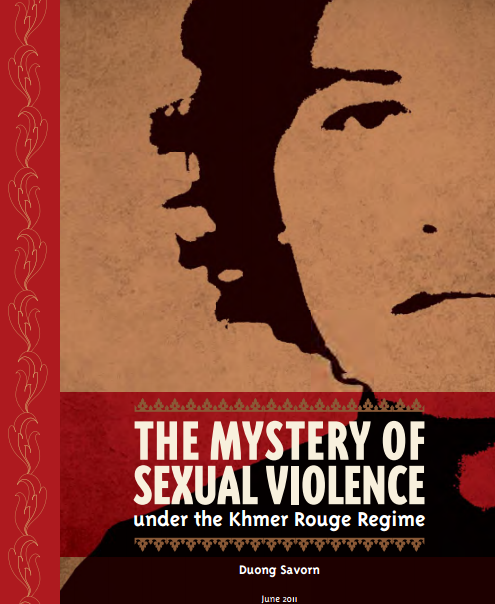
The Mystery of Sexual Violence Under the Khmer Rouge Regime
Publication Year: 2011 / Sources: Cambodian Defenders ProjectEven though the Khmer Rouge Tribunal is currently processing the trials against the senior leaders and those who were most responsible, the expectations of all victims for receiving justice have not yet been fulfilled. In addition, the court has actually investigated rape during that regime but could not link it to the responsibility of the senior leaders and the victims are not aware of the investigations into these crimes.
Download: English | Khmer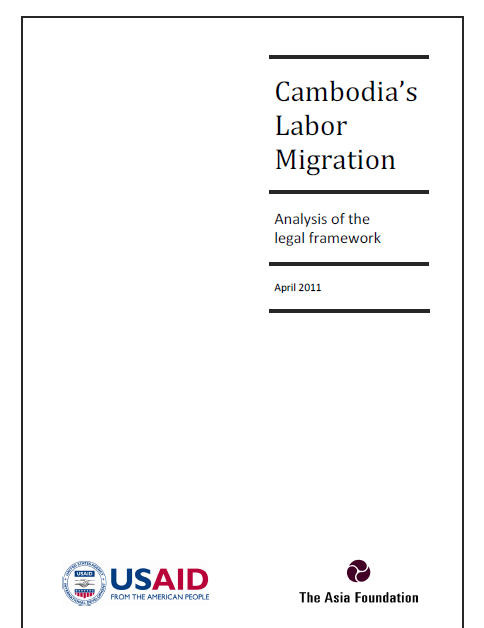
Cambodia’s Labor Migration: Analysis of the Legal Framework
Publication Year: 2011 / Sources: The Asia FoundationThe Royal Government of Cambodia (RGC) continues to develop policies concerning the migration of the Cambodian workforce overseas as a way of increasing domestic economic growth and combating unemployment. As regular migration for labor increases so does irregular migration.The Report analyzed the rules that govern regular migration while identifying legislation that can be employed to protect those who become victims during irregular migration and be used against those who perpetrate and profit from it.
Download: English | Khmer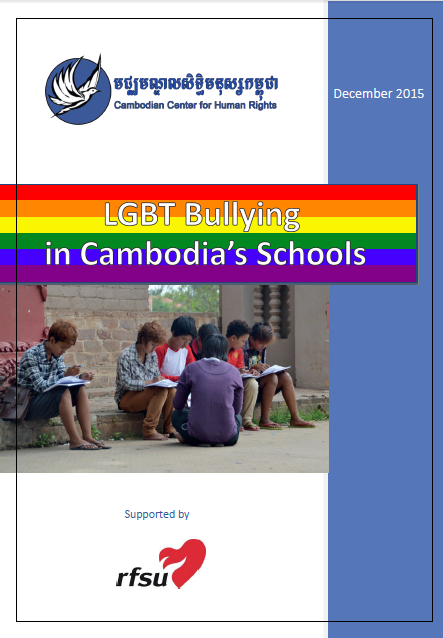
LGBT Bullying in Cambodia‘s Schools
Publication Year: 2015 / Sources: the Cambodian Center for Human Rights (CCHR)LGBT members of society are by definition guaranteed the same rights as everyone else; however, in Cambodia, while there are no homophobic religious traditions, there is at the same time no specific legal or normative protection for LGBT people, and societal attitudes remain largely negative towards LGBT issues. Family values are incredibly strong in Cambodian society and there is intense pressure on young people to enter traditional marriages and have children.
Download: English | Khmer
The Global Gender Gap Report 2015: Cambodia
Publication Year: 2015 / Sources: World Economic ForumThe Index benchmarks national gender gaps on economic, political, education and health criteria, and provides country rankings that allow for effective comparisons across regions and income groups. Cambodia ranking this year is 109 out of 145 countries with the score, 0.662.
Download: English | Khmer
The Global Gender Gap Report 2015
Publication Year: 2015 / Sources: World Economic ForumThe Index benchmarks national gender gaps on economic, political, education and health criteria, and provides country rankings that allow for effective comparisons across regions and income groups. The rankings are designed to create greater awareness among a global audience of the challenges posed by gender gaps and the opportunities created by reducing them.
Download: English | Khmer
Detention As Treatment: Detention of Methamphetamine Users in Cambodia, Laos, and Thailand
Publication Year: 2010 / Sources: Open Society InstittuteThis report examines the establishment and operation of centers to detain and “treat” methamphetamine users in Thailand, Cambodia, and Laos. It documents the increasing number of such compulsory drug treatment/detention centers (CDTDCs)1, examines the policies and practices that force people into them, and explores the implications for individual health, public health, and human rights.
Download: English | Khmer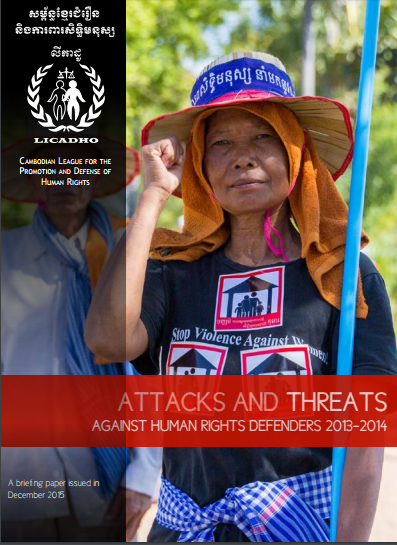
Attacks and Threats: Against Human Rights Defenders 2013-2014
Publication Year: 2015 / Sources: Cambodian League for the Promotion and Defense of Human Rights (LICADHO)As human rights defenders continue to play crucial roles in challenging state abuses, Cambodian authorities have
continued to use violence, intimidation and Cambodia’s corrupt criminal justice system to halt their activities and silence their voices.
